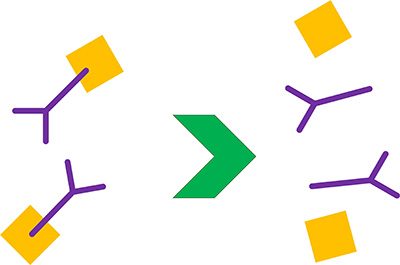 Protein titer monitoring is a common test used to determine the concentration of a specific protein in a sample. For example, it can be used to detect antibodies, or to control the manufacturing process for a protein-based biopharmaceutical. Protein titer monitoring can be performed as a manual test or may be automated.
Protein titer monitoring is a common test used to determine the concentration of a specific protein in a sample. For example, it can be used to detect antibodies, or to control the manufacturing process for a protein-based biopharmaceutical. Protein titer monitoring can be performed as a manual test or may be automated.
A titer is a way of describing a concentration, based on successively performing a binary (positive or negative) test on increasingly diluted samples. Typically twofold dilutions are performed between each test. Therefore the possible titers increment as powers of two (2, 4, 8, 16, 32…). The titer of the sample is the highest dilution that gives a positive test result. Therefore, if a sample gives a positive result for the first four dilutions, followed by a negative result for the fifth dilution, it would have a titer of 1:16 (2-4) which is often described as a titer of 16. Because simple binary tests are used, which are generally manually read, this type of testing can be easily implemented in a low-tech environment. A titer test, which dilutes a sample, is in some ways the opposite of a polymerase chain reaction (PCR) test which copies a very small DNA sample, amplifying to a sufficient concentration to be analyzed.
Protein titer monitoring data can be important when implementing a process analytical technology (PAT) approach. It also enables the optimization of process parameters such as cell culture conditions, protein yield, bioreactor run length and harvest time.
When used to detect antibodies in blood samples, a titer test can establish whether an individual has immunity to a disease. In Covid antibody tests, antigen proteins from the Covid virus are coated onto a plate and exposed to a blood sample. An enzyme and chemical reagent are also applied. If the blood sample contains Covid antibodies, they will attach to the viral antigens on the plate. This then causes the enzyme to stick to the antibody and the chemical reagent to activate, changing colour and indicating a positive result.





Tell Us What You Think!